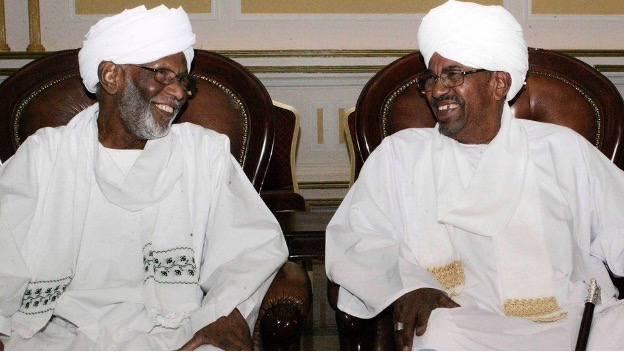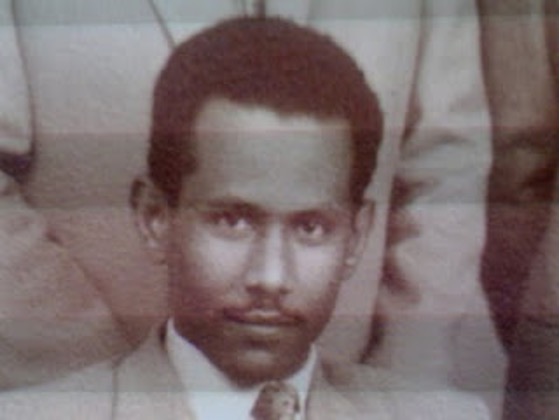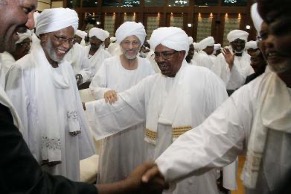
Today, Islamism is a spent political ideology in Sudan. For thirty years, the country was ruled by a highly corrupt and repressive military-Islamist regime. In the spring of 2019, popular protests pressured the regime’s head, Omar al-Bashir, to step down. The 2018-2019 revolution had two chief objectives, namely founding a democratic system and dismantling the Islamist regime. For protestors, these goals were inexorably tied as a democratic Sudan could not be founded in the shadow of a deep Islamist state. Yet, Islamists remain active in security forces and civil service and have used their influence to impede the revolution’s aims. This brief article traces the rise of Sudan’s Islamist movement, which transformed from a fringe political organization in the 1950s to becoming the state’s sole political authority in 1989. Additionally, it discusses policies Islamists pursued once they assumed power and the ensuing fragmentation within the regime. Finally, the article discusses the transitional government’s (July 2019 – October 2021) efforts to de-Islamize the state and disempower Islamists.

Sudan’s Muslim Brotherhood
Sudan’s Muslim Brotherhood, also known as the Movement (Al-haraka or Al-ikhwan), began as a branch of the Egyptian Muslim Brotherhood in the 1940s. It originated as a student movement but soon founded political associations and parties of sufficient clout to become a stable player in Sudan’s politics. Its objective, like its sister organization in Egypt, was to establish an Islamic state. However, in contrast to its Egyptian counterpart’s reformist ideology that followed a bottom-up approach to Islamization focusing on tarbiya or education, Sudan’s movement espoused a revolutionary ideology, believing that the Islamization of society needed to occur through the state and its institutions. During negotiations leading to Sudan’s independence, Islamists subsequently lobbied for the founding of an Islamic constitution, albeit unsuccessfully.

After Hassan al-Turabi, a lawyer with a doctorate from the University of Paris in constitutional law, assumed the movement’s leadership in 1964, Al-haraka’s political influence grew considerably. Although Turabi was an ideologue, he was also a pragmatist. He devised visions and strategies for the movement to increase its political power and advance its Islamization agenda. His pragmatism was most evident in the movement’s shifting tactics during Sudan’s periods of democratic and military rule. During military rule, the movement alternated its strategies between opposition and cooperation in light of the opportunities offered by the regime. In the parliamentary periods, Islamists formed political parties, fielded candidates, and built alliances with other political parties.
“Islamists’ cooperation with President Gaafar Nimerie’s regime (1969-1985) after the latter’s 1977 reconciliation efforts was a critical juncture for the movement. During this period, Al-haraka expanded both as a social movement and political force.“
Islamists’ cooperation with President Gaafar Nimerie’s regime (1969-1985) after the latter’s 1977 reconciliation efforts was a critical juncture for the movement. During this period, Al-haraka expanded both as a social movement and political force. With Nimerie’s reconciliation as well as an emerging and profitable Islamic banking sector in Sudan, Islamists were able to increase the movement’s resources exponentially, open new branches and admit scores of members. Islamists were also able to increase their presence in state institutions. In return for cooperation with Nimerie, many of them were awarded ministerial and judicial positions in his regime, including Turabi himself, who became attorney general. Islamists, during the same period, also started to infiltrate the military. The movement began to plant its own officers in the army, who were then charged with recruiting new members from within the military. Through indoctrination and financial assistance, the movement succeeded in drawing in new officers. Omar al-Bashir was one of the military men the Islamists recruited during this period.
As a result of the movement’s growth during the Nimerie period, it was able to acquire unprecedented reach and resources. Consequently, when protests led to the ousting of Nimerie in 1985, and elections were announced for another democratic period, Al-haraka was able to swiftly organize and campaign. The newly found National Islamic Front (NIF) came in third place after the two mainstream parties, National Umma Party (NUP) and Democratic Unionist Party (DUP). Much like the parliamentary governments that ruled Sudan from 1956–1958 and 1965–1969, the 1985 government suffered from incessant party dissension, rendering it ineffective in dealing with the deteriorating economic situation or the second Sudanese civil war that started in 1983. Between 1985 and 1989, five different governments were formed. Once the NUP formed a government with the DUP, secularists, leftists, and southern forces while excluding the NIF, the Islamist party suspended its participation in the National Assembly. Shortly after, the NUP government was overthrown by an Islamist orchestrated military coup.
“Turabi argued that Islamists executed the coup because hostile external and domestic actors would not allow Islamists to rule, whether they were part of a coalition or alone, citing the case of Algeria’s FIS. He claimed that other actors did not follow the rules of democratic politics when it came to Islamists.”
Turabi argued that Islamists executed the coup because hostile external and domestic actors would not allow Islamists to rule, whether they were part of a coalition or alone, citing the case of Algeria’s FIS. He claimed that other actors did not follow the rules of democratic politics when it came to Islamists. While it is true that external and internal actors placed pressure on the NUP to exclude Islamists, this was only due to the latter’s divisive political agenda that prioritized the application of Sharia law despite opposition from the largely non-Muslim Southern Sudanese. Ultimately Islamists carried out the coup to protect themselves, ensure access to power, and advance their program.
Islamists in Power
Once in power, Sudan’s Islamists followed several measures to consolidate power and implement their Islamization program. As soon as it came to power, the Islamist regime began to crack down on political and civil society organizations. One of its first decrees was the suspension of political parties and trade unions. A state of emergency was called, prohibiting demonstrations and opposition newspapers, and allowing the regime to arbitrarily imprison journalists and political activists. But government repression was not limited to political associations and civil society organizations. The regime also executed suspected unsympathetic officers in the military. Within a year of the coup, thirty-one army and police officers accused of coup plotting were killed. The regime also purged tens of thousands from the civil service and security institutions and replaced them with ideologues and sympathizers as part of the tamkin or empowerment policy.
Advancing its Islamization agenda, the regime launched al-mashru al-hadari or the “civilizing project” to respond to what it claimed was social decadence and to return Sudanese society to its vision of true Islamic practice. Subsequently, new legal and social policies were implemented. For example, the regime introduced the hudud punishments alongside Islamic laws. The regime also introduced new curricula at all education levels, with a heavy focus on religious sciences. Additionally, the regime imposed a dress code on women and girls. Although there was no official law imposing hijab on women, the government’s policing institutions used intimidation to enforce the dress code.
While it is plausible to characterize the regime as totalitarian in its early years, by the mid 1990s, Turabi started a process of political liberalization. For Turabi, reliance on the military was a temporary and necessary maneuver to rid the country of its ineffective and sectarian multi-party system after which he sought to establish an Islamic democracy. Turabi dissolved the military council that ruled the country until 1993, introduced an elected national assembly and presidency in 1996, and founded a new constitution that allowed for political associations in 1998. Nonetheless, critics argued that Turabi’s liberalization was a sham since he still maintained control of the state. Members of the opposition parties boycotted the elections and dismissed them as an attempt to coopt them.
“While it is plausible to characterize the regime as totalitarian in its early years, by the mid 1990s, Turabi started a process of political liberalization. For Turabi, reliance on the military was a temporary and necessary maneuver to rid the country of its ineffective and sectarian multi-party system after which he sought to establish an Islamic democracy.”
Though observers characterized the liberalization measures as a facade, the measures nonetheless spurred discord within the movement itself. Some Islamists disagreed with Turabi for ideological reasons, but the majority objected out of fear that any political opening would be a threat to their power. Additionally, many younger Islamists and military personnel felt stifled by Turabi’s authoritarian personality and power. Not only was Turabi the leader of the Islamic movement and the speaker of the parliament, but he was also the secretary-general of the newly founded Islamist National Congress Party (NCP). Turabi was the unchallenged head of the movement, government, and party.
In 1999, al-Bashir, with the blessing of the bulk of Islamists, including Ali Osman Taha who was Turabi’s deputy, stripped Turabi from his government and party positions and arrested him for allegations of conspiracy. After his release, Turabi founded the Popular Congress Party (PCP) to challenge al-Bashir, who emerged as the de facto ruler. Until his fall, al-Bashir ruled under the banner of Islamism while sidelining Islamist civilians, playing them against each other, and strengthening the military’s position. In 2013, prominent Islamists either left the NCP or were forced outside the ruling circle, including Ali Osman Taha. In the same period, al-Bashir started dialogue with Turabi’s PCP. The PCP sided with the regime during the 2013 protests and continued to be part of Bashir’s coalition until he was ousted by the recent Sudanese revolution.

Islamists’ Loss of Power
As I mentioned in my November 2021 article for the Maydan, the 2018-2019 revolution erupted in response to worsening economic conditions as well as widespread discontent with the regime’s mismanagement of the country. Thirty years of military-Islamist rule, marked by rampant corruption, repression, multiple devastating ethnic conflicts, and international isolation, left the country on the brink of collapse. It was no surprise that one of the revolution’s chief aims was to strip from the state its veil of Islamism and purge Islamists from its institutions.
In its efforts to de-Islamize the state, the transitional government took a number of measures. In June of 2020, the transitional government announced the end to a number of Islamic laws, including corporal punishments, bans on alcohol and apostasy, and restrictions placed on women such as dress code and the requirement of permission from male family members for travel. In 2021, the transitional government and rebel groups signed an agreement on the separation of religion and state. These measures were commended by international and Sudanese human rights organizations and activists for amending a discriminatory legal system.
Furthermore, to reverse the tamkeen policy, on November of 2019, the transitional government passed a law to “dismantle” al-Bashir’s regime. This law entailed the dissolution of the NCP and the confiscation of the party’s possessions. The transitional government also oversaw the establishment of the Anti-Corruption and Public Funds Recovery Commission (ERC) with the aim of removing Islamists from government institutions as well as seizing their properties. The commission was successful in retrieving a large number of assets that included residential and agricultural lands, companies and sums of cash. The Committee was also able to remove a large number of civil service employees who were connected to al-Bashir’s regime. Likewise, these changes were praised by the Sudanese public. For example, the Sudanese Professionals Association stated that the ERC’s efforts were significant for Sudan’s transition to civilian democratic rule.
“Islamists, nonetheless, maintain a continual presence in the country’s security institutions and have relied on them to salvage some of their dwindling powers.”
Islamists, nonetheless, maintain a continual presence in the country’s security institutions and have relied on them to salvage some of their dwindling powers. Following the October 21st coup, General al-Burhan dissolved the ERC. In addition to re-appointing civil service personnel dismissed by the ERC to their positions, the military generals sacked the attorney general and several prosecutors who oversaw investigation cases against members of the Islamist government and party. Furthermore, leading members within al-Bashir’s regime and the NCP were released, including the dissolved party’s former head and the former director and spokesman of the General Intelligence Service. Although, the Islamist figures were re-arrested following public outcry, observers have pointed that the incidence demonstrates the military’s interest in revitalizing its coalition with Islamists and that it still considers them to be an important force in the country.
For the Sudanese public however, Islamists have lost legitimacy and political appeal. The 1989 coup was perhaps the most serious mistake committed by Islamists. Abdelwahab el-Affendi, a Sudanese academic, noted that the first victim of the Islamist coup was the Islamist movement itself. In a sense, the failure of political Islam in Sudan is a reflection of the wider problem of weak state institutions and ineffective political organizations in the country, owing in part to a long colonial legacy. For instance, the unprofessional nature of the military opened it to tampering at the hands of various political forces. Unsurprisingly, Islamists were not the first to use the military to organize a coup in post-colonial Sudan. As for political organizations, even the two mainstream parties of the NUP and DUP are largely sectarian, lacking ideological coherence and strong internal structures. This contributed to the fractious nature of Sudanese politics and created opportunities for the military to step in.
“It is hard to imagine a future for political Islam in a democratic Sudan. Pro-democracy forces are keen to keep Islamists at bay from politics and power. They have made it a point to exclude Islamists from any negotiations on the country’s future.”
It is hard to imagine a future for political Islam in a democratic Sudan. Pro-democracy forces are keen to keep Islamists at bay from politics and power. They have made it a point to exclude Islamists from any negotiations on the country’s future. Meanwhile, Islamists have repeatedly criticized their exclusion with calls for reconciliation. Fully aware that a democratic system would likely provide only a minimized presence in state institutions and a sustained ban from politics, Islamists continue to oppose a transition to democratic rule.
Yet, the prospects of democratic governance in Sudan is more likely to be determined by the military and its allies in the region, rather than the Islamists. While the transitional government (2019-2021) managed to weaken Islamists by banning the NCP and imprisoning its leaders, it was not able to seriously challenge the military’s power who proceeded to overthrow it in October 2021. The military’s aim was to protect its political power and economic interests while also ensuring its members did not face prosecution for the killing of hundreds of protestors. In carrying out the coup, the military was emboldened by considerable backing from other states in the region. And while the U.S. has pressured these states to halt their endorsement of the military and encourage Sudan’s democratic transition, the U.S. itself has been criticized for inconsistent support of Sudan’s Democracy movement.
Today’s political crisis in Sudan can be surely traced to Islamists. With their 1989 coup, Islamists brought the military into politics as a junior partner. Despite the military tactically relegating them to the backseat, Islamists continued to provide it with ideological and political support, only allowing the generals to strengthen their political and economic hold over the country. While they billed themselves as the hope for the country and its peoples, Sudan’s Islamists have not only failed their promise but also damaged their reputation for the long-haul.

